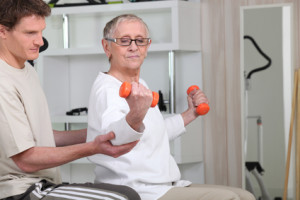As a certified personal trainer for over two decades, I’ve had the privilege of working with many people from all walks of life. I’m grateful that I’ve been able to find a way to help others have a better quality of life.
When I studied to become a multiple sclerosis fitness and wellness specialist I realized that people with MS can benefit from exercise and proper nutrition in a number of ways.This got me excited to learn all that I could about how to empower people who have MS.
 Studies have shown that exercise does not reduce relapse rates or slow progression of disability. However, regular exercise can make a difference in how a person with MS feels and functions. Increasing muscle strength and endurance keeps muscles and bones strong and more functional. Fatigue is a common complaint among people with MS and exercise can decrease fatigue and improve a person’s overall sense of well being. Other symptoms that can improve with exercise are anxiety, anger, depression, bowel and bladder difficulties, pain muscle stiffness (spasticity), sleeping difficulties and cognitive problems. Improvements in lung function and walking have also been noted.
Studies have shown that exercise does not reduce relapse rates or slow progression of disability. However, regular exercise can make a difference in how a person with MS feels and functions. Increasing muscle strength and endurance keeps muscles and bones strong and more functional. Fatigue is a common complaint among people with MS and exercise can decrease fatigue and improve a person’s overall sense of well being. Other symptoms that can improve with exercise are anxiety, anger, depression, bowel and bladder difficulties, pain muscle stiffness (spasticity), sleeping difficulties and cognitive problems. Improvements in lung function and walking have also been noted.
Hydrotherapy or water exercise may be especially well suited for people with MS who have leg weakness or walking difficulty. It is also beneficial as a cooling therapy to reduce heat sensitivity. Cooling therapy has a scientific basis. Nerve fibers (axons) that have damage to their insulating layer (myelin) as occurs in MS, exhibit the slowing or blocking of nerve signal conduction with small increases in temperature. Thus the decrease in temperature may facilitate transmission of nerve signals. That being said, air conditioning and cooling vests are excellent options to provide cooling therapy as well.
A well-balanced healthful diet is key to optimal health. The American Heart Association and the U.S. Dietary Guidelines (Developed by the U.S. Department of Health and Human Services) recommend a diet that is relatively low in saturated fat and high in polyunsaturated fat.
 In 1948, Dr. Roy Swank did clinical studies on people with MS and the benefits of having a diet that is low in saturated fat and high in polyunsaturated fat. His findings showed that people on the diet had less frequent and less severe attacks, along with less worsening of their overall neurological condition and a decrease in the death rate. The diet was reported to be most beneficial when it was started by people who were early in the disease course or who had mild disability. The diet eliminates high fat meats, high fat dairy or processed foods that contain saturated fats. It recommends a high intake of polyunsaturated fatty acids, cod-liver oil supplements and frequent meals with fish.
In 1948, Dr. Roy Swank did clinical studies on people with MS and the benefits of having a diet that is low in saturated fat and high in polyunsaturated fat. His findings showed that people on the diet had less frequent and less severe attacks, along with less worsening of their overall neurological condition and a decrease in the death rate. The diet was reported to be most beneficial when it was started by people who were early in the disease course or who had mild disability. The diet eliminates high fat meats, high fat dairy or processed foods that contain saturated fats. It recommends a high intake of polyunsaturated fatty acids, cod-liver oil supplements and frequent meals with fish.
The challenge to working with a client who has MS is that there is a wide range of disabilities associated with the relapsing and progressive forms of this condition. Symptoms vary from one person to the next. An exercise program may work one day and then the next day a variety of symptoms can be present making it a workout that must be tailored specifically for the energy level and limitations of that particular day. Careful assessment and monitoring at the beginning and throughout each session is crucial to facilitating a safe and effective exercise routine. Having a sense of humor and motivating the client in a supportive and caring way is essential to making it an enjoyable experience.
I remember a lovely lady named Barbara that I worked with and she always had a smile on her face when we had our sessions. We did chair exercises because she needed to be in a wheelchair. She didn’t have to tell me because I could see it in her face and her body language that exercising gave her more energy once we started moving and stretching her body. She told me that she looked forward to our sessions each week because she felt better about herself physically, mentally and emotionally since she started working out. Of course that made me want to do a happy dance because I live for comments like that. It confirmed what I knew, that exercise was helping to empower her and make a difference in her life.
Modern medicine offers more hope now than ever for the MS community but the best plan for optimal wellness is to make exercise and nutrition complement medical therapy. People don’t choose to have MS. They don’t choose the course that their MS will take. What we all can choose is to be as fit as our bodies will allow.
When we take steps to take charge of the things that we can improve, we become stronger, happier and feel better about ourselves.
Deena Russo is an AFAA/NASM, certified personal fitness group exercise trainer with over two decades of experience in the New York and Los Angeles areas. Her other specialties include an ACE and AFPA certification as a multiple sclerosis fitness and wellness specialist. Deena’s range of clientele is diverse, and she has experience and success with pre- and post-natal women and seniors.

